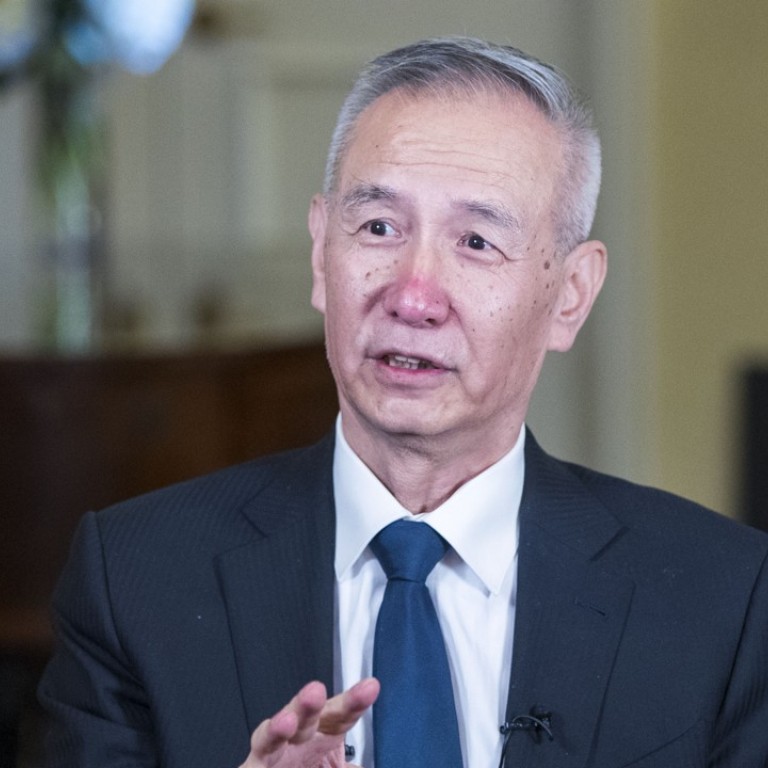
Liu He, China’s trade war chief, takes on new job retooling state industrial giants
Vice-premier enlisted to overhaul state firms despite leading unsuccessful effort to head off a trade war with the United States
Liu He, China’s point man on trade negotiations with the US, has taken on a new role spearheading state-owned enterprise reform, expanding his domestic economic portfolio despite failing to talk Washington out of a trade war.
Chinese President Xi Jinping handpicked Liu, a vice-premier and Harvard-educated economist, to lead trade negotiations with the US over the past few months. But after two unsuccessful trips to Washington and a trade war under way, Liu’s abilities had come under public scrutiny.
Liu He has an unenviable task as China’s point man in trade talks with US – but he’s not leaving
But his additional role overseeing change at the country’s state-owned behemoths may mean he still has the top leadership’s trust. There has also been no official announcement of him being replaced by other senior officials in the talks.
“I think Liu He is very important to Xi ... and China’s trade problem is not over,” Natixis senior economist Xu Jianwei said.
Xu said Liu’s new role, which was previously held by former vice-premier Ma Kai, might also reflect a desire in Beijing to focus more on domestic structural problems in the absence of any immediate prospect of the world’s two biggest economies returning to the negotiating table.

As head of the SOE reform leadership group under the State Council, Liu will lead 15 senior officials across ministries, including the central bank and China’s securities, banking and insurance watchdogs.
The central government has already started changing domestic economic policies to cope with possible fallout from an escalated and prolonged trade war with the US.
The State Council, China’s cabinet, said this week that it would adopt a “more proactive fiscal policy” and would speed up allocation of 1.35 trillion yuan (about US$199 billion) for local government spending on infrastructure. These efforts, along with a less aggressive monetary policy, are meant to “handle uncertainties in the external environment” – a reference to the trade war – and keep economic growth within the preferred range.
A minefield to walk through: Vice-Premier Liu He must steer China’s hi-tech industries to greatness, even as a trade war with US looms
“Now is a good time to push forward SOE reform. For a long time, it was the hardest bone to chew,” Xu said. “Part of that push comes from the US.”
Beijing and Washington have different views on China’s SOEs. Xi regards them as the backbone of the economy and has repeatedly urged them to become “bigger and stronger”, while US President Donald Trump has objected to Beijing’s industrial subsidies for the state giants.

While China has tried to help the state sector by showering it with cheap credit and writing off its debts, the government is also inviting private and foreign investors to take stakes in state enterprises in “mixed ownership” reforms.
Liu pushed the mixed ownership model when he was deputy head of the country’s top economic planning agency, the National Development and Reform Commission. At a conference in September 2016, Liu said China must break the monopolies of state enterprises to allow private money in sectors such as power, petroleum, natural gas, rail, airlines, telecoms and even defence.
Why Chinese Vice-Premier Liu He has the most difficult job in the US-China trade talks
Analysts said that with Liu at the helm of SOE reform there might be some changes down the road.
Michelle Lam, Hong Kong -based China economist at Société Générale, said SOE reform “has always been about consolidating the big guys to turn big ‘guys’ into national ‘champions’ rather than consistently doing what westerners would expect – to privatise companies”.
“Now Liu He has been assinged that role ... there might be more concrete steps on that front,” Lam said.

